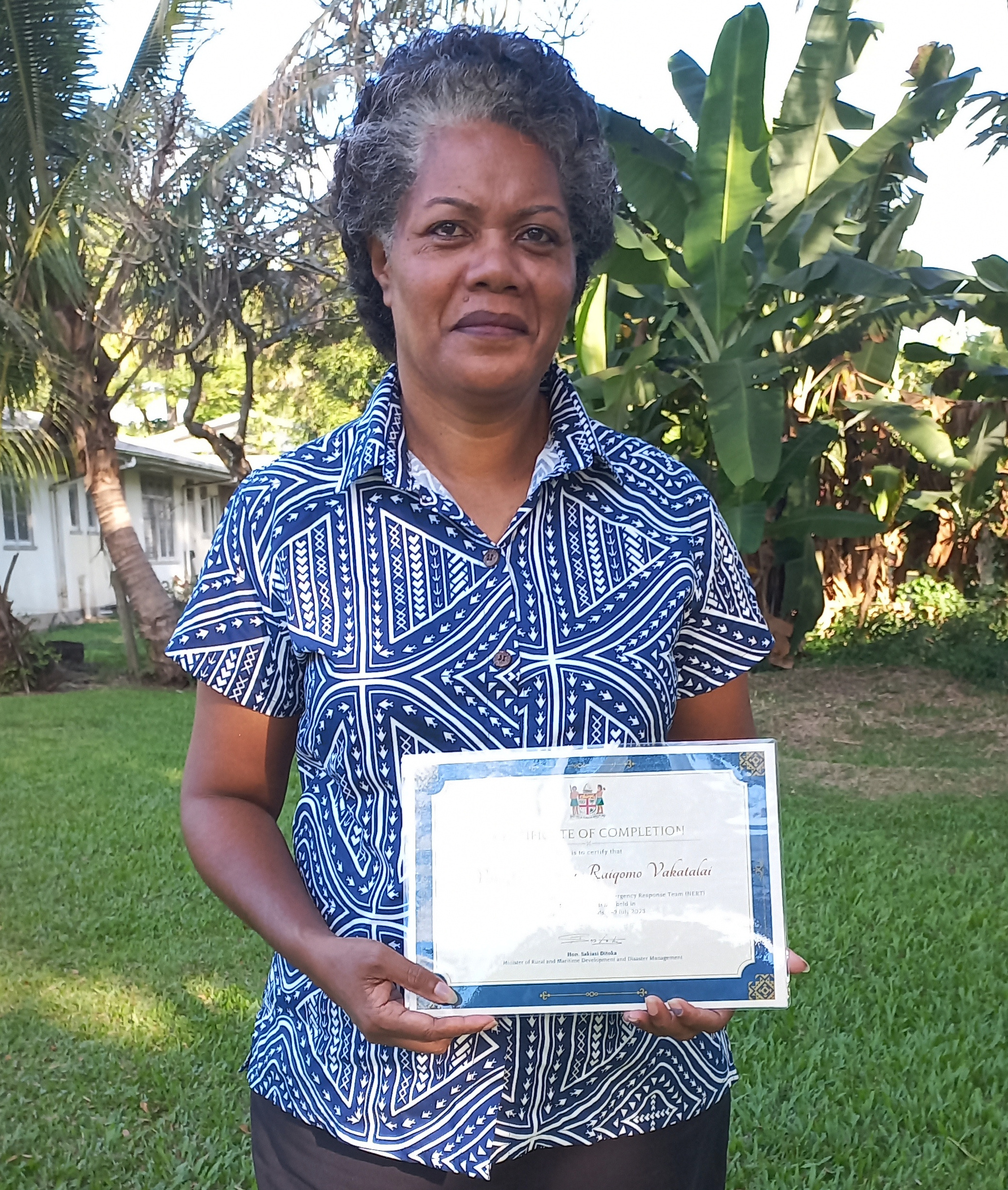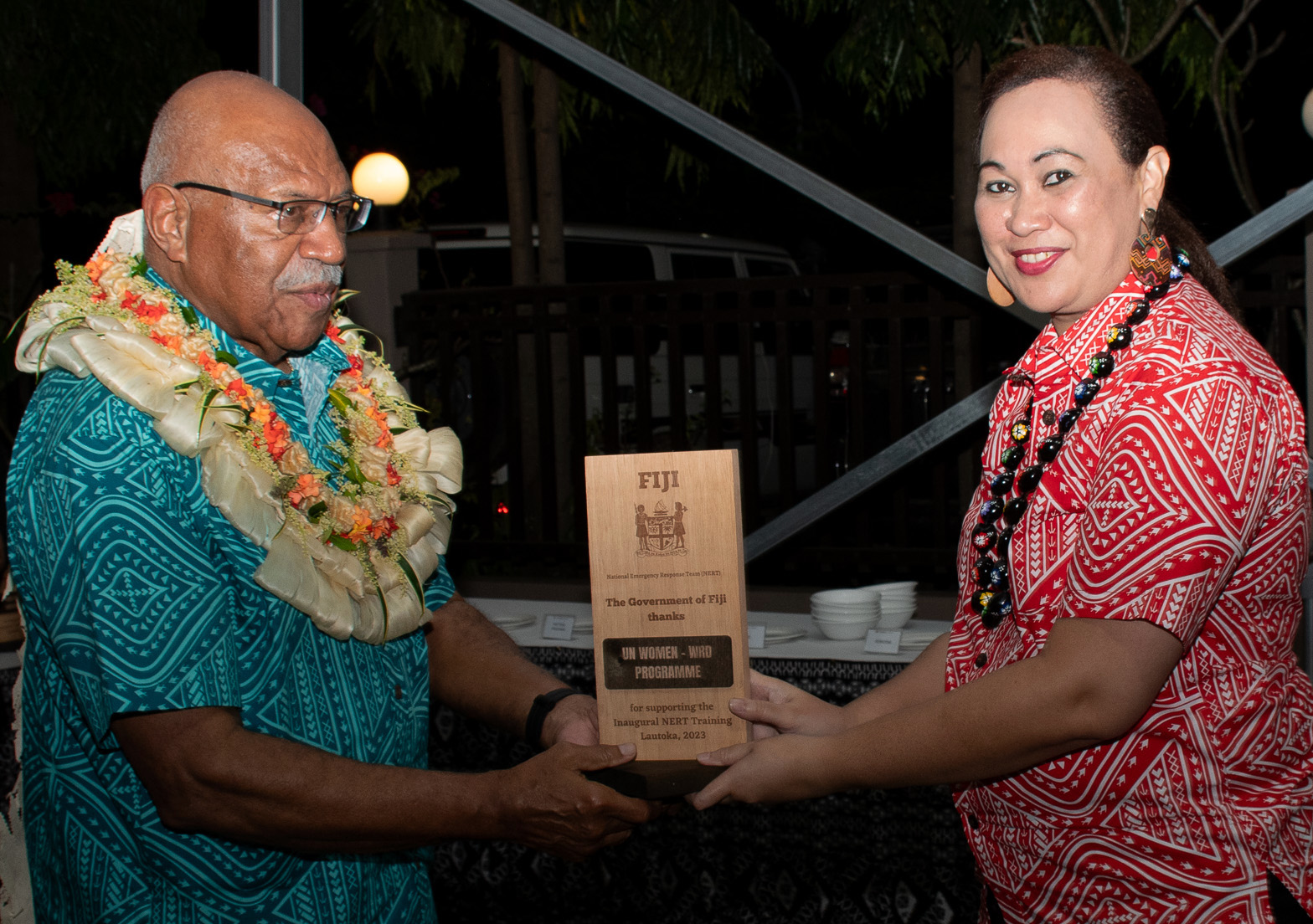Vani Vakatalai: Leading Women in the Community
Vani Vakatalai, District Officer for Tavua in the Ministry of Rural & Maritime Development & Disaster Management, participated in the National Emergency Response Team (NERT) training organized by the Fiji Government, National Disaster Management Office (NDMO) and supported by the Women’s Resilience to Disasters (WRD) Programme.
Vani Vakatalai is the District Officer for Tavua in the Ministry of Rural & Maritime Development & Disaster Management. Tavua is in the province of Ba in the Western Division of Viti Levu with a population of 23,269. Vani participated in the National Emergency Response Team (NERT) training organized by the Fiji Government, National Disaster Management Office (NDMO) and supported by UN Women Fiji Multi-Country Office (MCO) through the Women’s Resilience to Disasters (WRD) Programme, other UN agencies and development partners.
Vani is an iTaukei woman from Nakelo village in the province of Tailevu. She joined the civil service soon after graduating from high school. While employed in the civil service, Vani continued to pursue her education aspirations graduating with a Master’s Degree in International Relations and a Post Graduate Diploma in Public Law from the University of Fiji, Saweni Campus. After several stints in different ministries, she moved to the Ministry of Rural and Maritime Development and National Disaster Management Office.
Vani is a mother and a grandmother. She is a leader in government and in the community. As the District Officer for Tavua, Vani works across 9 villages and 50 settlements. She supports development projects; community capacity building programs and facilitates stakeholders’ engagements. She mediates when there are community disputes and provides other ancillary services to visiting delegations from government and development partners. A core part of Vani’s work is to coordinate, support and implement the National Disaster Management Office’s preparedness, response, and emergency operations in the district.
Vani considers the women that she works with in the communities to be pillars of strength in their families. They are the primary caregivers for the young and elderly members of the family and are also responsible for meals and other household work. As holders of traditional knowledge, Vani says the women understand weather patterns and can predict any form of disaster after observing and studying ecological signs and behaviors of certain animal and birds. They also play a very significant role in community building and often are part of community development. They also use available local resources to put structural measures in place as part of their disaster preparedness.

Vani elaborated on some of the capacity gaps that women have in the communities. Community women often lack the knowledge to understand scientific information on disaster preparedness disseminated by government agencies like the National Meteorological Office and NDMO. For Vani, this is an opportunity to connect official disaster risk and climate information with traditional knowledge that the women have used locally for disaster preparedness. Another area is collection and analysis of data. Vani says, “At community level there may be some valid data that are available that we are not aware of, and it can assist in terms of disaster preparedness and response”.
For Vani, the NERT was timely. “The NERT has benefitted me a lot as far as building resilience and disaster preparedness is concerned; to proactively plan so we minimize threats originating from disaster”. In terms of response and recovery, the NERT helped the participants to understand the vulnerabilities in the communities they work in and as a process, building disaster resilience by supporting the capacity of individuals, and communities to adapt through the available assets and resources relevant to their context.
Vani is particularly keen to ensure that women and girls in the community are not left behind.
“I can apply the NERT learning by involving women and girls in the communities to engage and be part of the disaster planning and mitigation process at community level, ensuring women and girls are not left behind during disasters. They can assist in identifying disaster risks for themselves that may not be understood by male partners. They can also help build security for their families, including increased awareness of personal preparedness and health”.
Supporting the leadership of women as emerging mentors at the community level is critical in building the resilience of women and girls to disasters and climate change. From her experience of working with women in the community, Vani says women are more understanding, strong-willed, tactical, and self-
aware in comparison to men and this is precisely what makes them terrific mentors. As such supporting women’s leadership is crucial since they encourage a women friendly culture; and if they are living in a safe environment, they can share their skills to other women and contribute to building a resilient community.
“Empowering women’s decision making in the community is required and necessary to promote women as leaders in all aspects. For instance, when events are organized in the community although men were the main focal point, they will still need a women’s group leader to be present at the discussion because they will be the driver of the event”.

With her newly acquired knowledge, Vani is looking forward to leading the community women to develop family preparedness plans that cover emergency contact information for family members, prearranged meeting places, home evacuation procedures, emergency pet care, safe storage of food and water, and assembling disaster supplies kits.
“They should be informed on the importance of disaster preparedness in their homes and community because it can save countless lives, speed up recovery and reconstruction, saves time and money and ultimately preventing and reducing the impacts of disasters on communities”.
The Fiji WRD team were present at the awards ceremony officiated by the Prime Minister of Fiji, Hon Sitiveni Rabuka. The team received the Government of Fiji’s recognition of UN Women’s support through the WRD programme to help establish the NERT and host the one-week training. The training also included UN Women WRD National Consultants and Coordinators supporting the two partners: Fiji NDMO and Ministry of Women, Children and Social Protection.